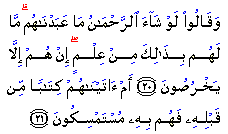Blaming God! Longing to Meet Thee, The Supreme Art
Issue 268 » April 2, 2004 - Safar 12, 1425
General
| Living the Quran |
Al-Zukhruf
(The Ornament)
Throughout the history the ignorant always blamed God's Will to cover up their deviation and error. They argued that their worshipping of idols and angels became possible only because Allah allowed them to do so. Had He not willed so they could not have done it; and then it had been a practice with them for centuries and no torment from Allah had descended on them, which meant that Allah did not disapprove of their practice. This argument, however, is wrong. For it is not only shirk which is being committed in the world, but countless other crimes like stealing, robbery, murder, bribery, etc. also are taking place, which nobody likes. Then, can it be said by the same reasoning that all such acts are lawful and good only because Allah is letting them happen in His world, and when He allows them to happen, He must have approved of them also? The means of knowing what Allah likes and what He hates are not the events that are happening in the world, but the Book of Allah, which comes through His Messenger and in which Allah Himself states as to what beliefs, what deeds and what morals He likes and what He dislikes. If these people have a Book, which came before the Quran, and which tells that Allah has appointed the angels and idols also as deities beside himself and that they should worship them also, they should cite it. The truth is that they have no authority of any divine book; the only authority they have is that it has been the practice since the time of their forefathers. Source: |
| Understanding the Prophet's Life |
Longing To Meet Thee Every one of us has to die. Death is not the end of everything, it is only a transition into the next phase. In that phase we will stand face to face with Allah. None of us likes to die; it is only human. But die we must, and only after death will the doors open to eternal life and blessings. If you understand the nature and reality of this-worldly life, if you know that you can receive your full wages only upon meeting Allah, then you will develop two feelings:
One of the dua the Prophet, blessings and peace be on him, used to make says:
Source: |
| Cool Bits! |
The Supreme Art Calligraphy of the Arabic Language is the supreme art of Islam. It is a double art.
In Arabic calligraphy, therefore, the discursive content and the
sensory presentation enhance each other and thus make calligraphy the
most popular and the most venerated art of Islam. Kings, princes, as
well as commoners often lived their whole lives with a single wish -
to produce, or cause to be produced, a copy of the Quran in beautiful
calligraphy. Never before Islam, and
nowhere else, did bookmaking ever become a genuine fine art.
Source: |
